Spoken Word Reviews
DISTRESSED NEANDERTHAL CALAMARI - Rob Barratt
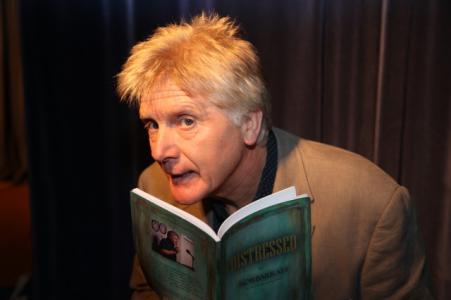
The show's title gives us a clue, albeit a cryptic one, into the content of the show and of course the mind of the creator – poet Rob Barratt. Drawn from three of the pieces performed, the juxtaposition of disparate ideas suggests a range of ideas poked about and cajoled into service to look at some contemporary issues.
Rob takes you on a journey through worries, politics, love, backpacking over 30, furniture, education, the 60's, the inability to say hello, human ancestry the weather in Aberdeen and more. Yes, Neanderthals are in there! His poems are a gently comic look at things old and new, and presented in a nicely relaxed, down to earth style.
Don't be worried if a song suddenly appears, and you are asked to sing - its that kind of a show. You can catch Rob at the Chelmorton Festival tonight (Tuesday) and again at the Old Clubhouse on Thursday and Friday.
Ian Parker Heath�
FREE SPEECH! MAKING A DIFFERENCE WITH WORDS - TheFED
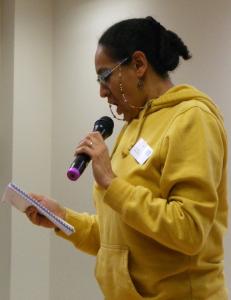
Having considered myself too uptight to cope with the Fringe show Women Who Wank, it was a little ironic to find myself plunged into a morning writing workshop whose theme was The Perils of Writing About Sex.
After a late start and some interesting introductions as we realised we had several published writers in our midst, session leader John Malcomson opened up proceedings, along the way offering up a range of entertaining quotes about sex, from John Callahan’s “sex is like air; it’s not important unless you are not getting it” to John Barrymore’s “sex is the thing that take up the least amount of time and makes the most amount of trouble”.
The nine of us were then invited to take five minutes to write about two people having sex - quite an ice-breaker! Subsequent exercises (interspersed with John’s interesting discussion points and readings from sexual descriptions, comic and otherwise from various novels) included describing the same sex scene without writing about the act itself, and creating a scene in which two people are not having sex, yet sex or the lack of it is very much in the air. What we all realised from this was that the latter two exercises yielded much better results; John felt they seemed much more “real”. It is not at all easy to write explicitly about sex and in any case the physical details are usually the least important aspect.
John opened us up to many different ways of thinking about and writing about sex and he also left us with a very useful handout full of his tips as well as an entertaining sheet in which three generations of authors talk about their experiences of writing about erotic encounters.
This was just one of several stimulating FED events on the Fringe. Today's full programme (Thursday July 21) includes another writing workshop this morning at The Tap House followed by an afternoon open mic session there from 2.30-4.30pm and an evening open mic at the Tea Chest 7.30pm-10pm. Look out for their flyer at the Fringe Desk for full details.
Stephanie Billen
FRINGE READINGS - Buxton Festival Fringe

Entering the Old Hall I was unsure of what to expect of the Fringe Readings, never having ventured to them before. In a large, spacious room we were introduced to our reader for that session, Anthony Gill, the mystery guest of this 30-minute slot. The fact that the chosen book is down to the choice of each reader was what drew me to this show. I think this is a great way to launch yourself into something a bit different from the other events at the Fringe and to take yourself out of your comfort zone to discover new literature.
Gill’s choice of book was One Man and His Bike by Mike Carter. Gill explained to us that it was about Mike himself who decided to go on a 5,000-bike trip around the British coastline. The first extract he read was at the start of the story where Mike decides to make the life-changing decision to go on this road trip and the reasons why. Gill's delivery conveyed the uncertainty of Mike’s thinking about the decision. My favourite part was his second extract from much later on in the book when he describes Mike’s shenanigans in Skye. Having just been to Skye a week ago myself and having thoroughly enjoyed it… I could relate to Mike’s long-term troubles there with midges. Mike meets a local cyclist and they seem to strike up a friendship anyway. Mike stays at his house and discover that this man makes instruments and furniture out of various different pieces of wood. I think that this extract was chosen for a very important reason as the local cyclist represents the Island Of Skye and an old way of living. As an audience we don't think that the modern world will touch Skye, until we learn that the local cyclist's son is going away to study video games design at University.
This is where Gill chose to end the extract and the 30-minutes' slot was up. I think this was a really interesting point to finish on. The Scottish cyclist’s son going away to study is somewhat bewildering to the father but it shows that we can’t stop change no matter how hard we try. It is also shows how engaging a successful travel journal can be, in a relaxed and humorous way acting as a commentary on life as encountered by the traveller.
Overall Gill delivers the extracts full of expression and he can do a decent Scottish accent! As this book seemed varied in content, I would have like to have heard more extracts to gain more of a feel for the book and to see what other shenanigans Mike got up to. �
Phoebe Alderson
THE GLUMMER TWINS - The Glummer Twins (David Harmer & Ray Globe)

The audience of 30 were crammed into Buxton Underground Venue for an hour of poetic entertainment provided by two talented performers, David Harmer and Ray Globe. It is now 30 years since the duo first appeared on stage together. They now describe themselves as the wizened Glummer Twins, hoping to put the 21st century to rights.
Not only have David and Ray written their own comic odes, based on the theme of growing older (now that they have achieved the age of the "silver surfers") but Ray also supplies excellent musical support through his electronic guitar and backing track.
The duo has the empathy and professional delivery of Morecambe and Wise, with the extra bonus that they have personally written and produced their own scripts - which could be claimed to be: "The odes wot they rote!".
Topics included train-spotters and ageing mods, middle-aged cyclists in lycra, buying a car from a dodgy dealer in Doncaster and much more.
The audience, mainly of the "third age" themselves, laughed and applauded enthusiastically after every hilarious rendition and there were calls of "more" as the hour of fun drew to a close.
I recommend this show to all those who enjoy a genuinely funny and talented performance.
This is my own attempt at poetry!
The "twins" should emerge from their Underground Venue,
And join the stars with their talented menu.
Thank you David and Ray.
Jackie Corrigan
GOD SAVE THE TEEN - Andrew Graves
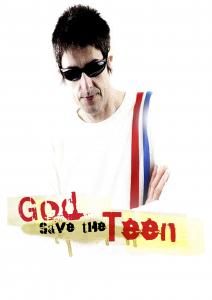
As a student of both English Literature and Language, I would like to say I know a good piece of writing when it hits me. And there’s no doubt for me that Andrew Graves’ ‘God Save the Teen’ was an excellent bit of wordplay.
Andrew is a poet, and a highly honest one. In fact, the first poem in his latest collection, ‘Light at the end of the tenner’, is even named ‘Truth’. And that is the lasting feeling I got from the show. Andrew didn’t hold back, and left the audience with a clear, authentic view of his formative years.
What I really loved about the show was Andrew’s engrossing use of form. He didn’t simply structure a piece; he brought the structure into the story. Jumping back and forth across time, bringing in references from previously in the show. Regularly, Andrew would recall a line or image from previously in the monologue, usually to very humorous effect. And once to incredibly powerful effect, the manipulation of form leaving me practically shocked. Pace, too, was employed wonderfully for both comic and emotional timing. And the lyricism of the lines, as Andrew creates vivid images and metaphors, dreams and nightmares, expand this piece beyond a story, into his mind.
In the beginning of the monologue, I was somewhat concerned, feeling Andrew could inject a tad more emotion into his deliverance of his highly emotional writing. Whilst I hold this to be true, perhaps it was just nerves to begin with, as Andrew did gain more and more emotion as the monologue progressed, and by the end I was really dramatically caught up in the feeling.
Andrew seems to champion himself as a working class poet of the 70s and 80s, and although I have not personally experienced these decades, I really felt ‘God Save the Teen’ was a story of these times, and that way of life. He jumped across time, from his teenage years to his experience as a youth worker with other teens (this contraption being a delight), and this grounding helps that splendidly.
Andrew is selling the latest collection of poems after the show, and having read the first few, I can verify that the wonderful crafting of the show is found there in its masses. It’s worth grabbing a copy, if you can.
To me, there’s no doubt Andrew is a truly wonderful writer, and one of the best crafters I’ve seen in a while. ‘God Save the Teen’ is to me one of the gems of the Fringe, and I would certainly encourage you to head down to see and listen.
Alex Paul
N.O.N.C.E. - Steve Larkin
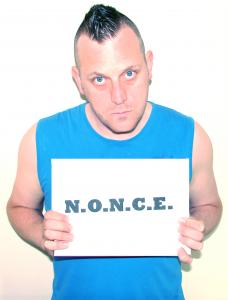
Steve Larkin wowed Fringe audiences in 2015 with Tes, a radical reworking of Hardy’s Tess of the D’Urbervilles, in the Theatre section. This year the poet and performer is back with an equally absorbing and hard-hitting work inspired by his real-life experiences working as a poet-in-residence at a high security prison.
N.O.N.C.E. is categorised under Spoken Word and the poetry within this one-man show is seamlessly integrated into the whole, evidenced both in actual poems, faultlessly and passionately performed, and in the word play and aliveness of the language throughout. To some extent, the show is about language. He tells us how N.O.N.C.E, the slang term for sex offender, stands for Not On Normal Courtyard Exercise, the sign put on their cell doors to remind the wardens to keep such pariahs well away from other violent prisoners. Larkin is sensitive to the way the prisoners express themselves, dissecting the simple statement: “I killed a bloke in a pub” for the devastating, memorably evocative “life sentence” that it really is.
Larkin has to remind the inmates that he is not their therapist but: “If you want to write a better, dark, twisted verse, I’m your man”. Tensions arise between himself and his colleague Dr Angus over whether he is in effect encouraging some of their darkest, most violent thoughts and these disputes, conducted in the limbo land of car journeys, resonate with us all generally as Larkin questions the whole purpose of art and poetry.
While the work is not for the faint-hearted - we learn exactly what some of these Category B murderers, rapists, armed robbers and paedophiles have done to be locked away - it is also laced with dark humour with Larkin sharing his very honest personal reactions to what he is faced with every day in the prison. We also see glimpses of his stormy personal life with Magda and his uncomfortable working relationship with the female university students who also become involved with the writing project and its climactic public performance. Along the way, he considers the fraught power politics of male/female sexual relationships, delivering what has to be the most unromantic love poem I’ve ever heard - first line: “You are the place where my man mess festers…”
One-person shows can be hard to sustain but Larkin breaks up his performance with feverish dreams, fuelled by his daily experiences “inside”, and with vivid portrayals of the different characters he meets in there. Having asked them all to name themselves after their artistic heroes, he brings us memorable personalities such as a prolifically talented Michelangelo and a desperately lacking-in-confidence Lennon. An unobtrusive soundtrack further enhances this thought-provoking, well-constructed and relevant show - a must see of Fringe 2016.
Stephanie Billen
VERA BRITTAIN AND THE WOUNDED SOLDIERS - Discover Buxton Tours

Fay Walker plays a young Vera Brittain, when she worked as a Voluntary Aid Detachment (VAD) nurse at the Devonshire Hospital in Buxton at the beginning of the First World War, tending wounded soldiers. Brought up in a wealthy family, Vera attended boarding school in Surrey, then studied English Literature at Somerville College University. However in the summer of 1915, she decided to delay her degree and offer her services ‘to do her bit’ for the war effort, but also to feel close to her loved ones involved.
Using the theatre of the magnificent Devonshire Dome as the ultimate prop, Walker provides a wonderful portrayal of Vera Brittain as she reflects on not only her role as a Voluntary Aid Detachment (VAD) nurse but on the war itself. The journey is not just as a spoken word but actually takes us around the building appreciating the largest unsupported dome in Europe. Interesting artefacts are pointed out and some history of the hospital as we traverse the ¼ mile each circuit takes.
But the power of this tour is in the emotion that we share with Vera -her anguish at the naivety or was it the inherent heroism of the boys who volunteered; her horror of the injuries the soldiers endured; the terrible losses suffered misreported as victories and the injustice of the inferior treatment of women. There is also her despair of being a young woman trapped in a small town and her frustration at the small mindedness of the do-gooders of Buxton. Once again we share her sadness as we discover that her brother, Edward and her fiancé, Roland had both volunteered, indeed quite eagerly and were to pay the ultimate price; along with 27 million others world-wide over a four year period.
Lighter moments follow with a poem written by a soldier being read out expertly by a member of the audience extoling the expertise of the nursing staff. We were then dared to walk straight across the dome, rather than round, (Matron would not have allowed it!) to discover the joy of the echo!
There is much documented about Vera Brittain, her later life, her subsequent autobiography best seller “Testament of Youth”, famous daughter Shirley Williams – just look on the internet. There is a cabinet just inside the main entrance detailing her role and family background and how she is entwined in the history of the Dome.
But please, don’t just read about her. GO TO THE DOME…go along and meet her, walk with her, share her observations, her joy and sadness and on her reflection and premonition that this was the start of an era of social change.
Excellent new writing by Vanessa Highet; look forward to much more.
Sandra J Cooper
A VICTORIAN CONVERSATION - Discover Buxton Tours
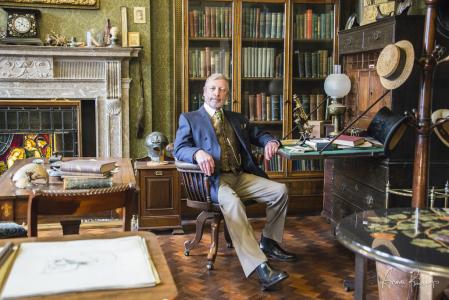
Many of us have a tendency to eavesdrop on conversations at neighbouring tables in restaurants but it is not exactly socially acceptable as a pastime. Tonight we had the opportunity to do just that by being a fly on the wall of ‘A Victorian Conversation’ between Robert Rippon Duke, who transformed Buxton from a village into a Victorian spa town, and Edward Milner, the landscape architect responsible for its Pavilion Gardens.
The Masonic Hall in Buxton was an ideal location to host this fictitious conversation between the two men. With its colourful carpet, lodge banners adorning the front wall and the remaining three walls filled with portraits of the Masters of Phoenix Lodge since its establishment 1869, the room is steeped in history. Under the banners, a table is set for two with an embroidered tablecloth, fine bone china and two ornate chairs.
All new arrivals were welcomed by Bill Weston, resplendent in the velvet cloak and buckled shoes of his town crier role. A hush descended on the audience as two gentlemen entered, dapper in their top hats, waistcoasts and tails. Weston explained the relevance of the venue to what we were about to hear, in particular that Robert Rippon Duke, creator of the Dome and the Palace hotel, was Master of this lodge in 1871. The chair he once sat in and the desk he used still take pride of place at the front of the room.
The conversation takes place over tea and Eccles cakes at the Palace hotel restaurant on the day before the opening of the Devonshire Royal Hospital (popularly known as the Devonshire Dome) on 10 October 1881.
Stephen Phillips and Thomas Eccles drew us into Victorian life from the outset, playing the parts of Duke and Milner respectively. The content had been developed by Discover Buxton and yet the natural dialogue was obviously unscripted and all the better for it. Only occasional slight glances at the ‘menu’ before them indicated that any prompts were used. Topics included steam travel (the ‘wonder of the age’), the treatments at the baths (including being wrapped in cold towels, pummeled black and blue, left on marble slabs and, rather worryingly, having an electric current passed through the water as you are in it) and, or course, the rich legacy both gentlemen have contributed to Buxton as a result of the Duke of Devonshire’s idea to develop the town as ‘a great inland resort’. Phillips and Eccles obviously have a wealth of knowledge about Buxton so could relax in their roles, sipping their tea and adding humorous anecdotes, such as a question from the Buxton Advertiser on why the completion of the Dome (the world’s largest unsupported dome at the time) was taking so long. The response? It keeps snowing!
As the audience departed, tearing themselves away from life in Victorian times to return to the 21st century, it was evident that everyone had enjoyed their evening of eavesdropping. Comments included: “Super evening!”, “Brilliant!”, “Great!”
It is a shame that this show was a one-off as I am sure there are many others who would have been delighted to witness this conversation. However, the good news is that it is possible to be shown around Buxton by Robert Rippon Duke or Edward Milner (played by Phillips and Eccles respectively), who provide a walking tour of their creations for groups. Contact www.discoverbuxton.co.uk for more information. I, for one, would relish spending more time with these fascinating gentlemen.
Sian-Elin Flint-Freel



